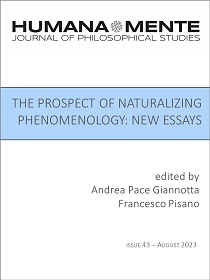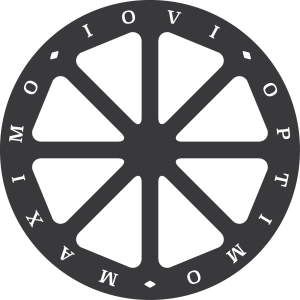
Fisica e Fenomenologia
The Concept of Time in Husserlian Phenomenology and Quantum Physics
Humana.Mente. Journal of Philosophical Studies
Vol 16 No 43 (August 2023)
Pagine 277-296
Indice
-Phenomenological time and its problems
-Quantum time and its problems
-Phenomenology and its solutions
-Quantum physics and its solutions
-Naturalising phenomenology, theoreticizing physics
Abstract
Through a comparison between phenomenology and quantum physics, the paper aims to show that naturalising phenomenology can also mean bringing it into a critical and fruitful relationship with some of the most complex and fundamental questions of contemporary physics, thus showing both the truly ever-open potential of Husserlian and Heideggerian thinking and the need for the sciences to receive a theoretical light without which they risk remaining either magical, arbitrary and esoteric knowledge or technical, reductionist and epistemologically sterile.
[Mediante un confronto tra fenomenologia e fisica quantistica, il saggio si propone di mostrare che naturalizzare la fenomenologia può significare anche porla in un rapporto critico e fruttuoso con alcune delle questioni più complesse e fondamentali della fisica contemporanea, mostrando in tal modo sia le potenzialità sempre aperte del pensiero husserliano e heideggeriano sia la necessità che le scienze ricevano una luce teoretica senza la quale rischiano di rimanere o conoscenze magiche, arbitrarie ed esoteriche, oppure approcci soltanto tecnici, riduzionistici ed epistemologicamente sterili]
===============
 Il numero 43 di Humana.Mente ha come tema The Prospect of Naturalizing Phenomenology: New Essays ed è composto da una limpida introduzione dei due curatori e da dodici saggi divisi in tre sezioni.
Il numero 43 di Humana.Mente ha come tema The Prospect of Naturalizing Phenomenology: New Essays ed è composto da una limpida introduzione dei due curatori e da dodici saggi divisi in tre sezioni.
Il mio contributo fa parte della terza sezione, dedicata a discutere «some classic yet ongoing debates regarding the most problematic and productive conceptual aspects implicit in the actual connection of theoretical frameworks and concrete problems within the scope of naturalized phenomenology» (p. VII).
L’Introduzione delinea la cornice epistemologica nella quale intendere il significato di questo numero della rivista. Fornisce inoltre le sintesi assai chiare e molto utili di ciascuno dei contributi.
Riporto quella che riguarda il mio testo. «Alberto Giovanni Biuso tackles one of the most important problems in phenomenology – and philosophy in general – i.e., the problem of time. He does so by comparing Husserlian phenomenology and quantum physics, with special reference to the opposition idealism-realism. According to Biuso, the phenomenological analysis of time-consciousness overcomes the idealistic and subjectivist tendency of Husserl’s philosophy. Regarding quantum mechanics, the author adopts a “processual” perspective (in continuity with the tradition of “process philosophy”), which contrasts those conceptions that deny the reality of time. In the end, the author proposes a “materic” conception of time, understood as the fabric of every reality, be it “subjective” (consciousness) or “objective” (world), showing how thinking about the reality of time is crucial to pursue the project of a “naturalized phenomenology”» (p. XII).
Ringrazio qui uno dei revisori (anonimi) del saggio, il quale lo ha giudicato «a fruitful and ambitious reflection in the current philosophical debate» e lo ho perfettamente sintetizzato in questo modo: «This paper is an original contribution that develops following three research directions that can be summarized as follows: (1) analysis of the concept of temporality in Husserl and overcoming its limitations through a “materialistic” perspective; (2) comparison with the main trends and theses of quantum physics; (3) investigation of the relationship that might exist between phenomenology and physics. The general assumption that drives the author’s research is that in order to understand and critically test Husserlian phenomenology and quantum physics, it is necessary to postulate a “strong” and “materic” concept of time at both a gnoseological and ontological level».


